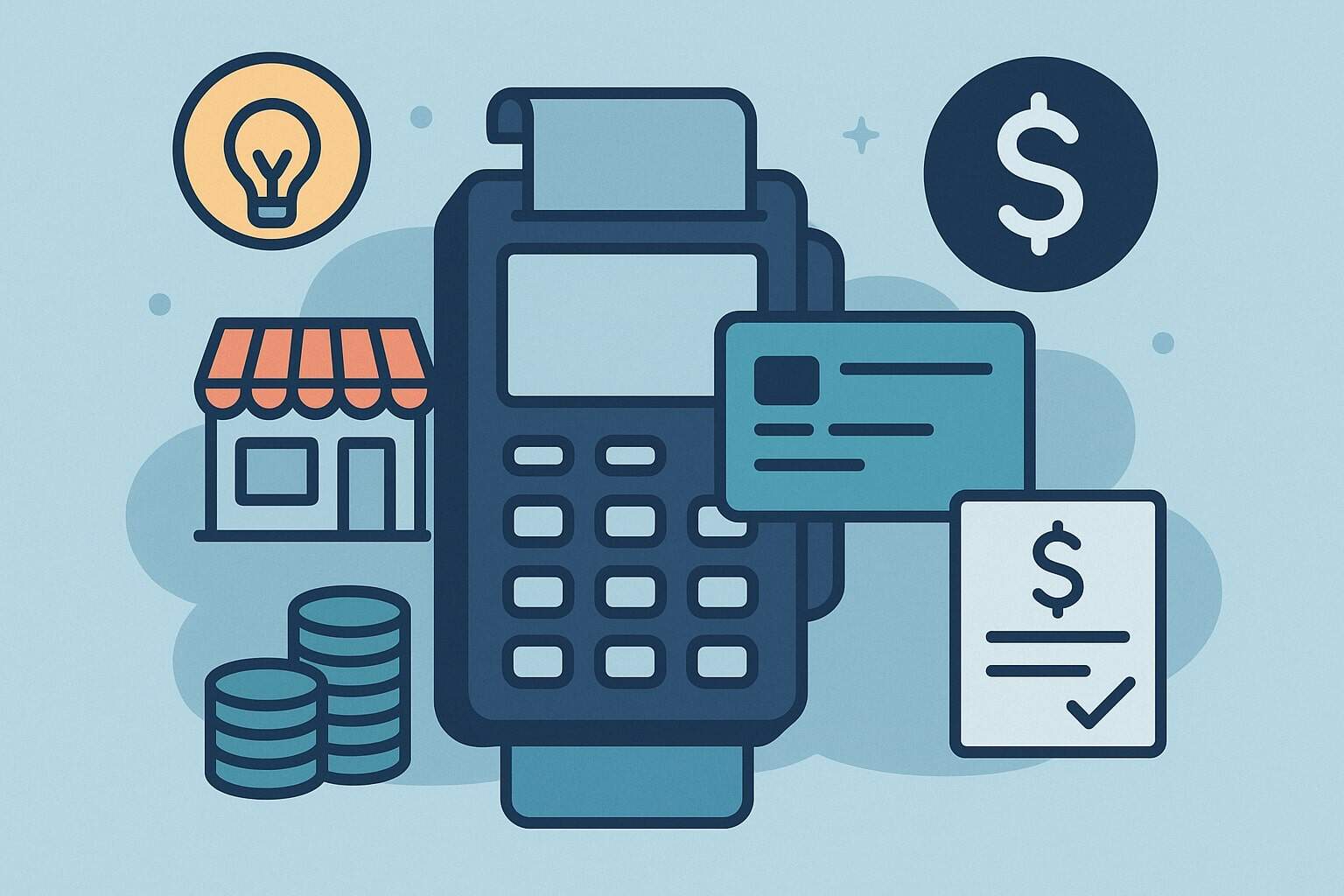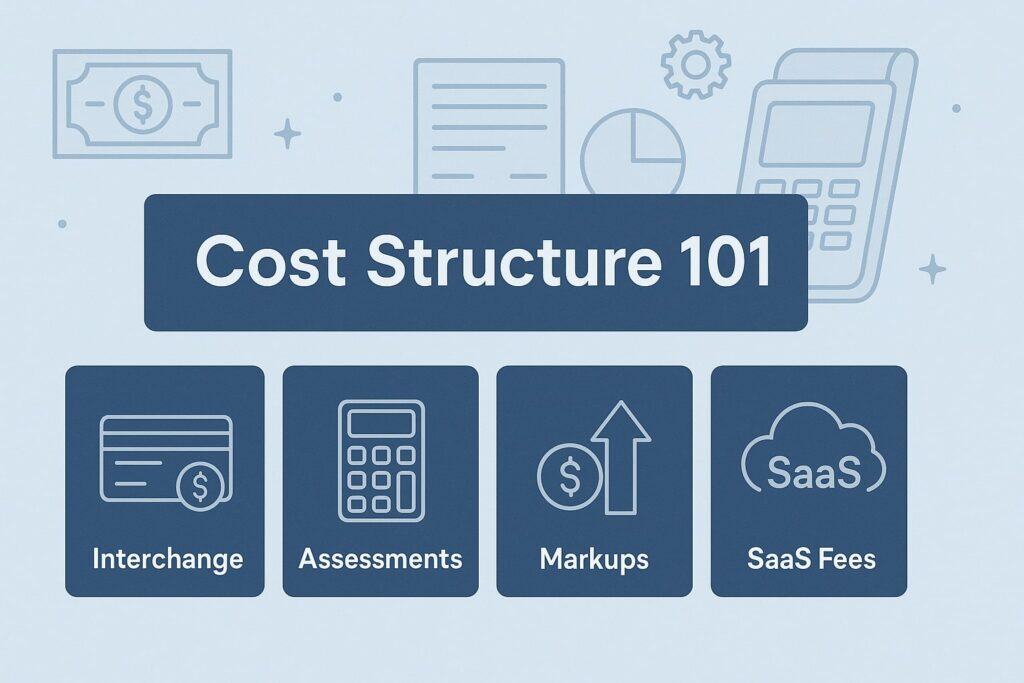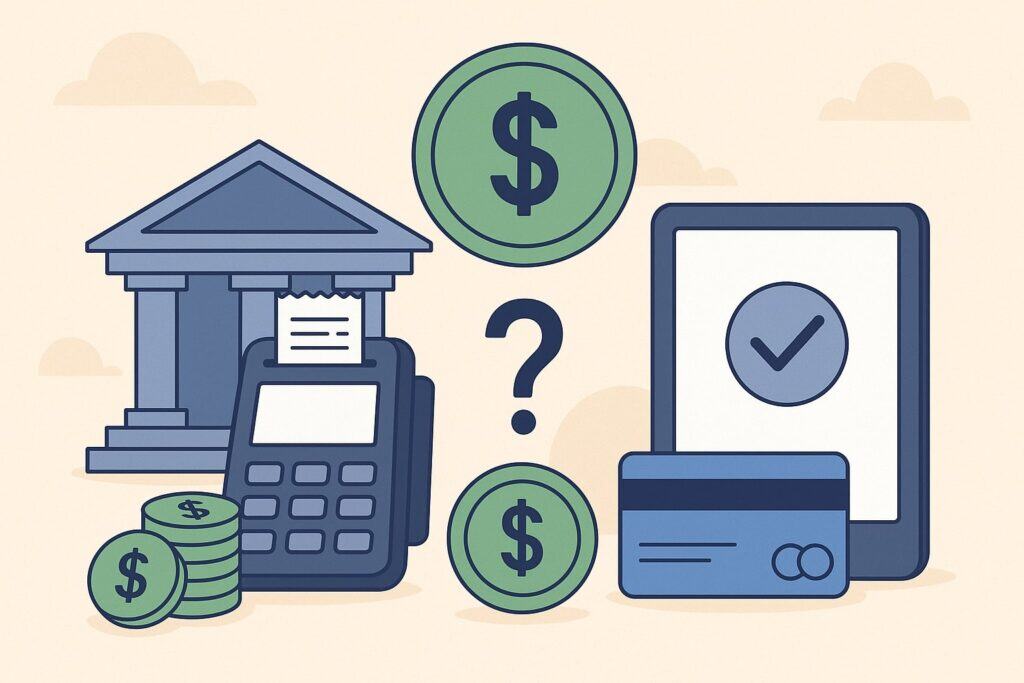
By Annabelle King October 10, 2025
Affordable payment solutions for startups and small businesses are tools, partners, and workflows that let you accept money without draining your margins or slowing growth. Affordability isn’t only about the sticker price.
It includes transparency, predictability, and total cost of ownership across software, hardware, and services. The best affordable payment solutions for startups and small businesses deliver reliable acceptance, quick settlement, and minimal overhead so founders can focus on customers and product.
Affordability starts with understanding where each rupee or dollar goes. Fees blend interchange, assessments, processor markups, gateway costs, and optional add-ons like fraud screening or recurring billing.
When these pieces are packaged clearly, startups can forecast cash flow and price their products correctly. That’s why the most affordable payment solutions for startups and small businesses emphasize plain contracts, modern APIs, and scalable pricing tiers.
Access also matters. Early teams need out-of-the-box onboarding, simple KYC, and developer-friendly docs. Small retailers need ready-to-use terminals, tap-to-pay on phone, and stable network connectivity. Affordable doesn’t mean bare-bones.
It means getting essential features such as tokenization, invoicing, and payouts without paying enterprise premiums. By matching features to your go-to-market stage, these affordable payment solutions for startups and small businesses help you sell faster, settle faster, and reinvest faster.
Core Payment Methods You’ll Use (and Where Each Is Affordable)

To choose affordable payment solutions for startups and small businesses, you need to know which rails fit your use case. Card payments dominate online and in-person commerce, offering high conversion and broad consumer trust.
Costs vary by card type, rewards level, and how you accept the card (card-present vs. card-not-present). Optimized setups reduce card costs through address verification, 3-D Secure where appropriate, and better data fields.
Bank-to-bank methods like ACH or bank transfers are often the most affordable for invoices, subscriptions, and B2B use. They carry lower fees but can take longer to settle and may require return handling. Real-time options, where available, bring speed with competitive pricing.
For many small businesses, combining cards for first-time purchases and ACH for renewals is the sweet spot. That’s why blended affordable payment solutions for startups and small businesses usually support both cards and bank rails.
Digital wallets—such as Apple Pay, Google Pay, or local wallets—boost conversion because they auto-fill credentials and prefer strong customer authentication. Wallet acceptance can also lower fraud rates. Buy now, pay later (BNPL) can lift ticket sizes but adds a provider fee.
For affordability, treat BNPL as an optional accelerator, not a default. The best affordable payment solutions for startups and small businesses help you toggle these methods on and off, test the ROI, and keep only what pays for itself.
Cost Structure 101: Interchange, Assessments, Markups, and SaaS Fees

Every transaction contains layers. Interchange goes to the issuing bank and varies by card brand, card type, and acceptance method. Assessments go to the network.
Your processor adds a markup, and your gateway (if separate) charges per-transaction or monthly fees. Affordable payment solutions for startups and small businesses make these layers visible so you can run accurate unit economics.
Understand fixed vs. variable. Fixed monthly SaaS can be a bargain at scale, while per-transaction pricing is easier when volume is small. Look for blended pricing transparency, especially if you mix online and card-present.
Some processors offer pass-through interchange where you see the exact table; others bundle into flat rates. For many founders, interchange-plus is the clearest road to affordability because markups are explicit.
Don’t ignore ancillary costs. Dispute fees, PCI tools, early-termination penalties, and premium support can inflate TCO. The most affordable payment solutions for startups and small businesses publish these extras, cap them when possible, and provide dashboards to track net revenue after fees. The more you see, the more you can tune.
Merchant Account vs. Aggregator: Which Is More Affordable for You?

Aggregators (payment facilitators) board merchants quickly under a master account. They are great for fast launches because you avoid underwriting complexity. Flat pricing is common and predictable, which helps very early-stage teams.
However, as volume climbs, flat rates can exceed what a dedicated merchant account would cost. That’s where affordable payment solutions for startups and small businesses begin to shift.
A direct merchant account takes longer to set up but unlocks fine-grained control, negotiable markups, and advanced features such as Level 2/3 data.
If you expect meaningful card volume, subscriptions, or B2B invoices, a merchant account plus a competitively priced gateway often becomes the more affordable path. Many small businesses start with an aggregator, then migrate when MRR or average ticket supports better economics.
Watch for risk and stability. Aggregators sometimes hold funds or re-underwrite midstream. Dedicated accounts typically provide clearer risk thresholds and account reps.
The most affordable payment solutions for startups and small businesses let you begin on an aggregator-like sprint and graduate to a merchant account without rewiring your entire stack.
Pricing Models Compared: Flat, Interchange-Plus, Subscription/Wholesale, Tiered
Flat rate pricing is simple. You pay a single percent plus a fixed fee, regardless of the card. This is predictable at low volume but can become expensive as your mix shifts toward debit or regulated cards.
Interchange-plus passes actual interchange and assessments through, then adds a transparent markup. For many teams, interchange-plus is the foundation of affordable payment solutions for startups and small businesses because it scales fairly.
Subscription or wholesale models combine a monthly platform fee with very small per-transaction markups. These shine at scale or in B2B where tickets are larger. They also reward optimization efforts like Level 2/3 data.
Tiered pricing buckets transactions into “qualified” or “non-qualified” rates. While common, it can obscure true costs and surprise founders. If you pick tiered, demand clear definitions and audit your statements.
Your goal is alignment. The most affordable payment solutions for startups and small businesses align processor incentives with your growth.
If your provider profits when your costs drop, you’ll see ongoing help with routing, data quality, and fraud controls. Ask for a sample monthly statement. If you can’t reconcile it in minutes, keep looking.
Essential Features That Keep Costs Low (Without Cutting Capability)
Affordability improves when you increase approval rates, reduce fraud, and qualify for better interchange. Start with tokenization to keep cards on file securely and maximize repeat conversion.
Use network updater tools to refresh expired credentials and avoid involuntary churn. These are must-haves inside affordable payment solutions for startups and small businesses because they pay for themselves.
Next, implement Level 2/3 data for B2B or government cards. Proper data fields can unlock lower interchange categories.
Capture AVS and CVV for card-not-present transactions. Add 3-D Secure selectively to high-risk segments to reduce chargebacks without denting conversion. Smart retries and dunning workflows rescue payments that would otherwise fail.
Finally, insist on transparent reporting. You should see auth rates, soft declines vs. hard declines, reason codes, and the impact of each optimization.
Affordable platforms make this visibility standard. When you can measure friction and cost at each step, you can keep refining your affordable payment solutions for startups and small businesses without guesswork.
Online Payments Stack on a Startup Budget
An online stack has three pillars: checkout, processing, and risk. Checkout includes hosted pages, drop-in elements, SDKs, and API endpoints.
Look for mobile-ready components, local language and currency support, and wallet toggles. Strong UI reduces cart abandonment and lowers your effective cost per funded transaction—key for affordable payment solutions for startups and small businesses.
Processing should support multiple acquirers or at least flexible routing. If your provider offers smart routing, you can improve approval rates across networks and issuers.
For subscriptions, you’ll want proration logic, metered billing, couponing, and invoice workflows. These features cut back-office time and make affordability real, not theoretical.
Risk management includes device fingerprinting, velocity checks, blacklist/allow lists, and ML-based scoring.
Start simple: enable address verification, set sensible velocity rules, and monitor disputes weekly. As volumes climb, graduate to more sophisticated rules. Affordable solutions let you stage changes and A/B tests, protecting conversion while reducing fraud.
In-Person Payments on a Budget: Terminals, Tap to Pay, and mPOS
Brick-and-mortar startups and pop-up merchants need pragmatic hardware. Entry-level mPOS readers pair with phones or tablets and accept tap, chip, and swipe. Smart terminals run Android-like apps, print receipts, and manage inventory.
Tap-to-Pay on compatible smartphones removes the reader entirely. These options keep affordable payment solutions for startups and small businesses flexible and mobile.
Plan for connectivity and power. Choose Wi-Fi with 4G failover if your environment is busy or remote. Look for offline mode to queue transactions safely during outages. For cost control, rent or buy hardware only as needed and standardize on one or two models to simplify training.
For omnichannel affordability, pick a provider that shares tokens across online and in-person channels. When a customer buys in store, you can recognize them online, reduce fraud checks, and streamline loyalty.
The right affordable payment solutions for startups and small businesses collapse physical and digital walls so you manage one customer, not two.
Cross-Border and Local Payment Methods Without Breaking the Bank
International expansion introduces new rails, currencies, and compliance. Cross-border cards carry extra fees, and FX spreads can quietly erode margin. Affordable payment solutions for startups and small businesses address this with local acquiring where possible, transparent FX, and support for popular local methods.
Start with markets that match your product. Enable region-specific wallets or bank transfers customers already trust. Offer pricing in the local currency to reduce conversion friction.
For settlement, decide whether you want to receive funds in local currency or convert to your home currency. Affordable platforms let you pick per market.
Minimize complexity. Avoid custom integrations for each country if your provider already supports them. Lean on built-in tax calculation and invoice templates for VAT or GST where helpful.
The more standardized your cross-border playbook, the more your affordable payment solutions for startups and small businesses will scale cleanly.
Faster Payouts and Cash Flow: Instant, Same-Day, and Next-Day
Cash flow is oxygen. Payout speed drives hiring, inventory, and marketing decisions. Many affordable payment solutions for startups and small businesses now offer next-day or even same-day deposits for a modest fee.
Instant options like push-to-card or real-time bank rails can move funds within minutes. Use them strategically for payroll, supplier prepayments, or seasonal spikes.
Balance speed against cost. Not every settlement must be instant. Map use cases, then choose a default like next-day while reserving instant for urgent transfers. Ensure reconciliation stays simple. Your dashboard should match payouts to batches and fees so your accountant never plays detective.
If your model disburses funds to sellers or service providers, look for split payments and sub-merchant onboarding. Affordable platforms reduce compliance friction while giving you control over schedules, reserves, and minimum balances. The result is a payout strategy that saves time and protects margins.
Reducing Chargebacks and Fraud—Affordably
Chargebacks are expensive even when you win. They burn time and can raise network risk scores. The most affordable payment solutions for startups and small businesses aim to prevent rather than merely dispute.
Begin with clear descriptors so customers recognize charges. Send receipts instantly. Use shipping with tracking and require signatures for high-value orders.
Implement step-up authentication when risk signals appear. 3-D Secure on suspicious transactions can deter fraudsters and shift liability. Keep customer communication easy—offer self-serve cancellations, refunds, and subscription pauses. A small concession early often prevents a costly dispute later.
When disputes occur, respond with evidence packs that include proof of delivery, customer communications, and usage logs. Affordable platforms streamline this with templates and one-click document uploads.
Track win rates by reason code and feed insights back into your rules. Prevention plus efficient response is what keeps affordable payment solutions for startups and small businesses truly affordable.
Compliance Without Overhead: PCI DSS, KYC, and More
Compliance protects your brand and keeps you processing. For many founders, PCI DSS feels intimidating. Affordable payment solutions for startups and small businesses reduce scope with hosted fields, tokenization, and prebuilt checkouts so you complete a lighter SAQ. Choose providers who publish clear PCI guidance and help you avoid storing raw PAN data.
KYC and AML are part of onboarding and payouts. Expect to provide basic documents and beneficial ownership details. Affordable providers automate checks, reducing back-and-forth. If you operate in regulated verticals or handle subscriptions, confirm your provider supports those use cases without surprise freezes.
Other frameworks—like SOC 2 for vendors or NACHA for ACH—may apply. The goal is to minimize internal effort while meeting standards.
Good partners treat compliance like an integrated feature, not an add-on upsell. That’s how affordable payment solutions for startups and small businesses keep your team focused on customers instead of forms.
Building for Scale: From MVP to Series A Without Rewrites
Your first integration should not be your last. As volume grows, you’ll need better routing, richer analytics, and stronger dunning. The best affordable payment solutions for startups and small businesses support this journey without forcing rewrites. Look for versioned APIs, webhooks, and SDKs in your primary languages.
Data portability is crucial. If you ever migrate, you’ll want to take tokens, customer profiles, and subscription states with you. Confirm that your provider offers secure token migration in and out. This leverage keeps pricing honest and protects your roadmap.
Finally, consider the human layer. Even affordable platforms should provide responsive support, sandbox access, and sample apps. If your provider treats your questions like feature requests, costs will rise indirectly through delays. Affordability includes time, and your time is expensive.
The Negotiation Playbook for Affordable Payment Solutions
Prepare a one-page profile: monthly volume, average ticket, chargeback rate, channels, and growth forecast. Share it during discovery calls. Ask for pricing under multiple models—flat, interchange-plus, and subscription—so you can compare apples to apples.
This is where affordable payment solutions for startups and small businesses emerge through data, not hype.
Request a sample statement and a draft MSA. Highlight early-termination clauses, PCI fees, dispute fees, and hardware lease terms. Push for month-to-month or short minimums. If you bring meaningful volume, ask for commitment-based discounts tied to milestones rather than time locks.
Negotiate support SLAs and uptime credits. Confirm roadmap items you need and get them in writing if possible. Run a 30-day pilot alongside your current provider and measure auth rates, decline reasons, and net revenue.
Let numbers pick the winner. That’s the most reliable way to secure affordable payment solutions for startups and small businesses that truly fit.
Implementation Checklist You Can Use This Week
- Define your payment flows: one-time, recurring, invoices, payouts. 2) Choose rails: cards, ACH/bank, wallets. 3) Pick a pricing model that matches volume. 4) Configure fraud basics: AVS, CVV, velocity rules. 5) Enable tokenization and updater tools.
These are foundational steps for affordable payment solutions for startups and small businesses. - Build or drop-in checkout with mobile responsiveness. 7) Set up webhooks for events like payment succeeded, failed, refunded, and disputed. 8) Test edge cases: partial refunds, voids, retries. 9) Configure payout schedules and reconcile in your accounting system. 10) Train staff on terminal use, offline mode, and refund policies.
- Monitor dashboards weekly. 12) A/B test wallet buttons and 3-D Secure thresholds. 13) Review monthly statements for hidden charges. 14) Document processes for PCI and disputes. 15) Re-quote with providers every 6–12 months.
This cadence keeps your affordable payment solutions for startups and small businesses tuned and defensible.
Common Mistakes That Make “Affordable” More Expensive
The first mistake is chasing the lowest headline rate while ignoring approvals and fraud. A cheap processor with poor routing costs more in lost orders. True affordable payment solutions for startups and small businesses balance price with performance.
Second, teams skip tokenization and card updater tools. Involuntary churn is silent but deadly for subscriptions. Third, founders accept tiered pricing without clarity and end up in non-qualified buckets.
Ask for interchange-plus or documented tiers. Fourth, hardware leases can trap you in long contracts. Always compare buy vs. lease.
Finally, no one owns payments internally. Assign a payment owner—even part-time—to review reports, disputes, and fee drift. A few hours a month can save thousands. Affordability is a habit, not a one-time negotiation.
Scenario Playbook: Picking Affordable Options by Business Model
- DTC eCommerce brand: Start with aggregator onboarding for speed. Use hosted checkout, Apple/Google Pay, and basic fraud rules.
As volume passes your target, switch to interchange-plus with Level 2 data where applicable. This progression locks in affordable payment solutions for startups and small businesses without risking launch timelines. - B2B SaaS with subscriptions: Prioritize ACH for renewals and cards for sign-up. Implement dunning, smart retries, and account updater. Add invoice tools for manual payers. Subscription/wholesale pricing often beats flat rates.
- Local retailer or pop-up: Use tap-to-pay on phone or a budget smart terminal. Enable offline mode for events. Keep a single provider for in-person and online to unify tokens and reduce fraud checks.
This is a practical path to affordable payment solutions for startups and small businesses that scales with foot traffic. - Marketplaces and platforms: You’ll need split payments, sub-merchant onboarding, and compliance tooling. Choose providers with embedded payments features and strong payout scheduling. It keeps affordability intact while handling complexity.
FAQs
Q.1: What’s the most affordable payment method for recurring invoices?
Answer: Bank-to-bank (ACH or local equivalents) usually costs less than cards. Use cards for sign-up to maximize conversion, then offer ACH for renewals. Pair both inside your affordable payment solutions for startups and small businesses to optimize cost and convenience.
Q.2: How do I keep my card fees down without hurting conversion?
Answer: Capture AVS/CVV, enable wallets, and add 3-D Secure only for high-risk transactions. Consider interchange-plus or subscription pricing. These tactics preserve conversion while making affordable payment solutions for startups and small businesses sustainable.
Q.3: Are flat rates bad?
Answer: Flat rates are fine for low volume and fast launches. As you scale, compare against interchange-plus. If your mix leans toward debit or presentment, pass-through pricing may be cheaper. Affordable choices change with volume.
Q.4: Do I need a gateway and a processor, or just one?
Answer: Many providers bundle both. If you need special routing or features, a separate gateway can help. Either way, ensure total cost is clear. The best affordable payment solutions for startups and small businesses minimize vendor sprawl.
Q.5: How often should I re-negotiate?
Answer: Review statements monthly and re-quote every 6–12 months or after major milestones. Competition keeps your affordable payment solutions for startups and small businesses honest.
Conclusion
“Affordable” isn’t a single fee—it’s a system. The most affordable payment solutions for startups and small businesses combine transparent pricing, flexible rails, and practical risk tools. They help you win more approvals, reduce disputes, and settle money quickly with clean reconciliation.
Start where you are: pick a simple model that fits today’s volume. Enable the features that pay for themselves—tokenization, updater, and basic fraud controls. Add ACH for recurring or B2B flows. Then measure relentlessly.
When the data shows you’re ready, graduate to interchange-plus or subscription/wholesale pricing and negotiate with confidence.
Keep one owner accountable, watch reports weekly, and treat payments like a product. Do that, and your affordable payment solutions for startups and small businesses will protect margins, accelerate growth, and keep customers coming back—without surprise costs or avoidable friction.